| Srl | Item |
| 1 |
ID:
105709
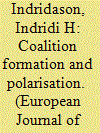

|
|
|
|
|
| Publication |
2011.
|
| Summary/Abstract |
Party ideology plays an important role in determining which government coalitions form. Research on coalition formation tends to focus on the ideological distance between coalition parties. However, the distribution of preferences within the coalition, and the legislature, also has implications for which government coalition forms - that is, a party's willingness to join a coalition depends not only on its prospective coalition partners, but also on the alternative coalitions it could form. Several hypotheses about the effects of legislative polarisation are offered and tested using data on coalition formation in 17 parliamentary democracies in the postwar period. This article also demonstrates how the traditional measure of ideological divisions within coalitions fails to capture certain aspects of ideological heterogeneity within the cabinet (and the opposition) and how Esteban and Ray's polarisation index helps in addressing these deficiencies.
|
|
|
|
|
|
|
|
|
|
|
|
|
|
|
|
| 2 |
ID:
105707
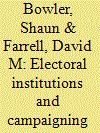

|
|
|
|
|
| Publication |
2011.
|
| Summary/Abstract |
This article develops and tests a number of competing expectations (institutional, party and individual) about what influenced the campaign activity of individual parliamentary candidates for the 2004 European Parliament elections. The principal interest is in the effects of variations in the design of electoral institutions across the Member States of the European Union. Based on the analysis, it is argued that an important distinction needs to be made between campaign effort and campaign goals, with electoral institutional factors having a more significant role over the latter.
|
|
|
|
|
|
|
|
|
|
|
|
|
|
|
|
| 3 |
ID:
105705
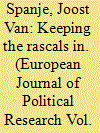

|
|
|
|
|
| Publication |
2011.
|
| Summary/Abstract |
Coalition governments in established democracies incur, on average, an electoral 'cost of governing'. This cost varies across coalition partners, and is higher for anti-political-establishment parties. This is because, if such a party participates in a coalition, it loses the purity of its message by being seen to cooperate with the political establishment. In order to demonstrate that anti-political-establishment parties suffer an additional cost of governing, this article builds on the work by Van der Brug et al. and refines the standard cost of governing theory by 'bringing the party back in'. The results of the analyses, based on 594 observations concerning 51 parties in seven Western European countries, cast doubt on the conventional concept of a cost of governing that pertains to all parties equally. The findings call for a major revision of the standard cost of governing literature, while adding a significant contribution to the debate on strategies against parties that may constitute a danger to democracy.
|
|
|
|
|
|
|
|
|
|
|
|
|
|
|
|
| 4 |
ID:
105704
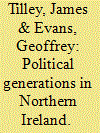

|
|
|
|
|
| Publication |
2011.
|
| Summary/Abstract |
Since the late 1980s, Northern Ireland has seen a radical electoral shift away from the historically dominant parties in the Catholic and Protestant blocs - the Social Democratic and Labour Party (SDLP) and Ulster Unionist Party (UUP), respectively - towards the traditionally more 'extreme' parties - Sinn Fein and the Democratic Unionist Party (DUP). This change in aggregate support has been accompanied by increasing differences between generations as older cohorts of UUP and SDLP supporters have been replaced by newer cohorts of DUP and Sinn Fein partisans. This is not a result of increased polarisation in values and attitudes (whether overtly political or simply communal intolerance) among younger cohorts who are, if anything, slightly more moderate than their forbears. Rather, this results from the changing political context in which new generations have been socialised - in particular the expanded choice sets facing voters as they have reached voting age. This in turn has positive implications for the consolidation of devolved democratic governance.
|
|
|
|
|
|
|
|
|
|
|
|
|
|
|
|
| 5 |
ID:
105706
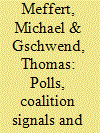

|
|
|
|
|
| Publication |
2011.
|
| Summary/Abstract |
Polls and coalition signals can help strategic voters in multiparty systems with proportional representation and coalition governments to optimise their vote decision. Using a laboratory experiment embedded in two real election campaigns, this study focuses on voters' attention to and perception of polls and coalition signals. The manipulation of polls and coalition signals allows a causal test of their influence on strategic voting in a realistic environment. The findings suggest that active information acquisition to form fairly accurate perceptions of election outcomes can compensate for the advantage of high political sophistication. The theory of strategic voting is supported by the evidence, but only for a small number of voters. Most insincere vote decisions are explained by other factors. Thus, the common practice to consider all insincere voters as strategic is misleading.
|
|
|
|
|
|
|
|
|
|
|
|
|
|
|
|